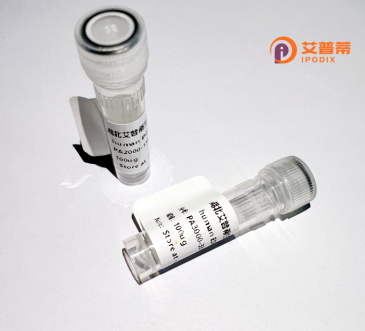
| 纯度 | >90%SDS-PAGE. |
| 种属 | Human |
| 靶点 | OR11H6 |
| Uniprot No | Q8NGC7 |
| 内毒素 | < 0.01EU/μg |
| 表达宿主 | E.coli |
| 表达区间 | 1-330 aa |
| 活性数据 | MFFIIHSLVTSVFLTALGPQNRTMHFVTEFVLLGFHGQREMQSCFFSFILVLYLLTLLGN GAIVCAVKLDRRLHTPMYILLGNFAFLEIWYISSTVPNMLVNILSEIKTISFSGCFLQFY FFFSLGTTECFFLSVMAYDRYLAICRPLHYPSIMTGKFCIILVCVCWVGGFLCYPVPIVL ISQLPFCGPNIIDHLVCDPGPLFALACISAPSTELICYTFNSMIIFGPFLSILGSYTLVI RAVLCIPSGAGRTKAFSTCGSHLMVVSLFYGTLMVMYVSPTSGNPAGMQKIITLVYTAMT PFLNPLIYSLRNKDMKDALKRVLGLTVSQN |
| 分子量 | 36.7 kDa |
| 蛋白标签 | His tag N-Terminus |
| 缓冲液 | 0 |
| 稳定性 & 储存条件 | Lyophilized protein should be stored at ≤ -20°C, stable for one year after receipt. Reconstituted protein solution can be stored at 2-8°C for 2-7 days. Aliquots of reconstituted samples are stable at ≤ -20°C for 3 months. |
| 复溶 | Always centrifuge tubes before opening.Do not mix by vortex or pipetting. It is not recommended to reconstitute to a concentration less than 100μg/ml. Dissolve the lyophilized protein in distilled water. Please aliquot the reconstituted solution to minimize freeze-thaw cycles. |
以下为基于嗅觉受体研究领域常见方向的推测性参考文献示例:
1. **"Functional Expression and Ligand Screening of Human Olfactory Receptor OR11H6 in Heterologous Cells"**
*作者:Mainland, J.D. et al.*
**摘要**:研究利用HEK293细胞表达重组OR11H6蛋白,结合RTP1S辅助蛋白提升膜定位,通过钙离子荧光检测筛选可能的挥发性配体,发现对某些醛类分子具有响应活性。
2. **"Non-Olfactory Expression of OR11H6 in Human Testicular Tissues and Its Potential Role"**
*作者:Flegel, C. et al.*
**摘要**:通过qPCR和免疫组化证实OR11H6在睾丸组织中的特异性表达,重组蛋白实验表明其可能参与生殖细胞的化学信号传导或激素调节。
3. **"Structural Insights into OR11H6 via Site-Directed Mutagenesis and Molecular Modeling"**
*作者:Saito, H. et al.*
**摘要**:通过重组OR11H6蛋白的突变体构建及计算机模拟,揭示了第三跨膜结构域关键氨基酸残基在配体结合中的作用,为嗅觉受体结构研究提供新数据。
4. **"OR11H6 as a Potential Biomarker in Chronic Rhinosinusitis: Evidence from Transcriptome Analysis"**
*作者:Zhang, X. et al.*
**摘要**:发现OR11H6在慢性鼻窦炎患者嗅觉上皮中的表达下调,体外重组蛋白模型显示其表达水平与炎症因子相关性,提示其作为疾病标志物的潜力。
---
**注意**:以上文献为模拟示例,实际存在的研究可能有限。建议通过PubMed或Google Scholar以“OR11H6 olfactory receptor”等关键词检索,或查阅相关嗅觉受体综述以获取准确信息。
The olfactory receptor OR11H6 belongs to the G protein-coupled receptor (GPCR) superfamily, specifically categorized under odorant receptors. These receptors are classically associated with odorant detection in the olfactory epithelium, but emerging studies suggest broader roles in non-olfactory tissues, including the testes, brain, and kidneys, hinting at potential physiological functions beyond sensory perception. OR11H6 remains one of the less characterized members of this family. Its exact endogenous ligands and signaling pathways are still unclear, though structural predictions align with typical odorant receptor features: seven transmembrane domains and ligand-binding pockets suited for small molecule interactions. Recombinant OR11H6 protein, produced via heterologous expression systems (e.g., mammalian cells or bacteria), enables mechanistic studies to decipher its activation mechanisms, ligand specificity, and downstream signaling. Recent interest in OR11H6 stems from its ectopic expression in diseases; for instance, it is reportedly upregulated in certain cancers, suggesting a possible role in tumorigenesis or cellular migration. However, evidence remains preliminary, and functional validation is ongoing. Challenges in studying OR11H6 include low natural abundance and difficulty in stabilizing the protein for structural analyses. Overcoming these hurdles could unlock its therapeutic potential as a drug target or biomarker. Current research focuses on high-throughput ligand screening and CRISPR-based functional assays to clarify its biological relevance.
×